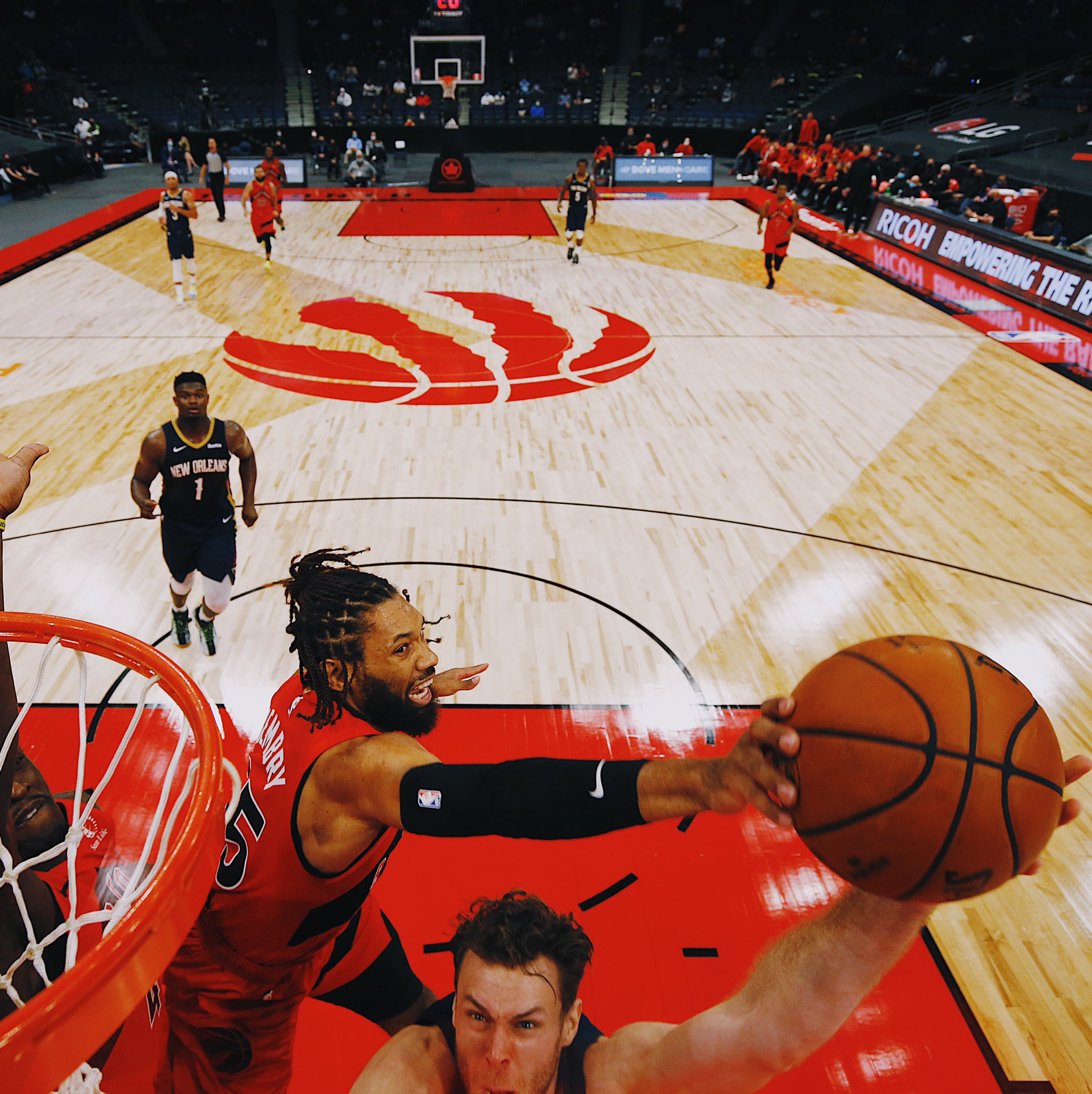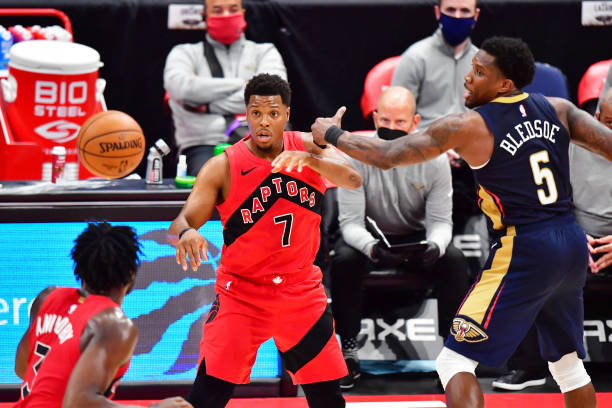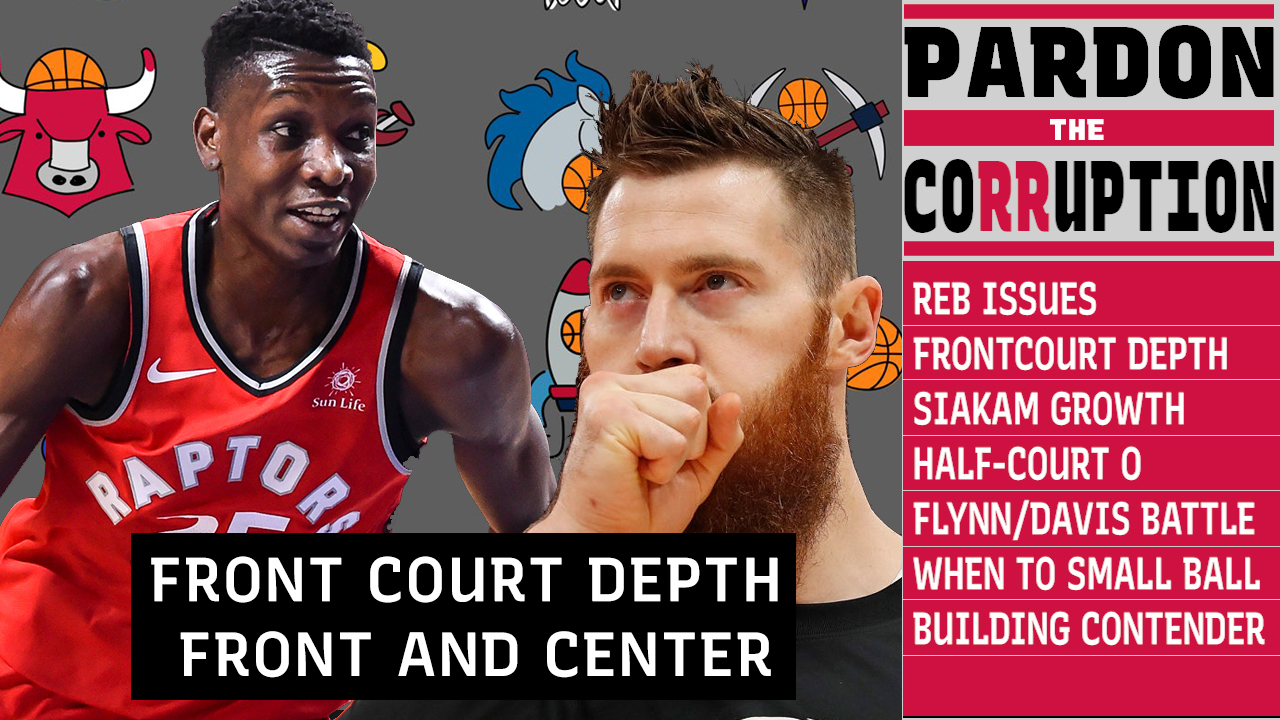The last time the Toronto Raptors were below .500 was January 7, 2014. It was a different era; Patrick Patterson scored 20 points off the bench, while Amir Johnson started and scored zero. Kyle Lowry was the only thru-line with that time, and he scored 16 of Toronto’s 79 total points. Toronto fell to 16-17, but they finished the season on a tear, going 32-17 over the remaining regular season. So one quick takeaway that should be infinitely clear to anyone who’s watched basketball in the past: it’s normal for good teams to lose games.
But massage that lesson into another one: there are a variety of Raptors who have never experienced being below .500 in the NBA, not even in the tumultuous beginning of a season. Norman Powell, Pascal Siakam, OG Anunoby, Fred VanVleet. They’ve won basketball games to such an extent that losing one single game sets a new low for their regular season careers. That’s a long history of excellence. And, of course, the streak is now broken, but the players’ long history of excellence remains unmarred because, again, it’s normal for good teams to lose games.
And Toronto’s long history of excellence ought to continue this year, despite a loss. There was plenty to like in this one. First and foremost, Pascal Siakam looks not just his old self, but improved in a variety of ways. The wise among us predicted this would happen. But Siakam seems improved in two ways. For one, his jumper is much smoother, both his wrist and the movement of his lower body. He’s now shot 12-of-24 from deep through pre-season and the first game. He won’t remain at 50 percent for the year, but the improved number combined with the improved aesthetics forebode a real jump in his shooting. Beyond the quality of the shot, he’s much less hesitant to take his shot, firing immediately whenever defenders duck under screens. He hit off the catch and pulling up against New Orleans.
Perhaps even more importantly, Siakam’s passing has come a long way. He was decisive as a passer, hitting shooters in the pocket while on the move, and dumping the ball to Anunoby in transition for dunks. Siakam finished with six assists, and that could well have been more considering the high-calorie looks teammates saw when Siakam hit them with a pass. Nick Nurse has spoken openly about shifting Siakam’s attention now to playmaking, considering his scoring ability, and he said after the game that six assists is “certainly a good place for him to be.”
Of course, Lowry was brilliant. He finished with 18 points and 10 assists, and he looked as spry as he ever has. For that reason alone, fear not about the loss. As long as Lowry is healthy and playing like himself, the Raptors are going to win 50 games year in and year out forever. After game one, it’s safe to say that Lowry is playing like himself.
One of the more surprising wrinkles of Toronto’s game was the center rotation’s ability to create on the short roll. Lowry has long been a master of passing to short-roll centers — Exhibit A-B, Marc Gasol and Serge Ibaka — and Chris Boucher and Aron Baynes performed admirably in that role. They aren’t traditionally short rollers, but both had great plays in that situation. Boucher hit a short push shot and an elbow jumper in the first half, and later Baynes hit a push shot from almost the free throw line. Both Boucher and Baynes are efficient rollers when hitting the deep paint, and it only bodes well that their offensive games are versatile enough to take advantage of Lowry’s wizardry in all situations.
Boucher in general was a revelation. After a herky jerky pre-season, he settled into form in game one. His defense was on point, as he blocked two shots but more importantly didn’t jump out of position for others. He battled on offense and scored an uber-efficient 12 points.
So why did the Raptors lose, then? A fair question, considering all the positive elements dotting the game. Well, the Pelicans got hot from deep, making 19 triples, while three of Toronto’s best shooters in Anunoby, VanVleet, and Powell combined to clank their way to 3-of-19. That happens even to the best teams.
On top of the misses, Toronto committed 20 turnovers. It was ugly and often unforced, hearkening back to Toronto’s sickening turnover parade in the playoff series against the Boston Celtics.
“I think some of them were just uncharacteristic,” explained Nurse after the game. “They were just really simple little plays right in front of us that we didn’t make a good pass on and that really put us in a bind. I thought that there was a long stretch of the game, take the turnovers out of it where the offence was really cooking good.”
If that wasn’t enough, Toronto’s defense was poor. The effort wasn’t there for everyone, and Baynes especially didn’t always fit into the scheme. It’s a big ask for any new player to understand Toronto’s complex defensive strategies, but especially a center; Toronto asks as much of its centers on the defense end as any team in the league. Baynes is a good defender, and he even had one impressive possession during which he stayed in front of Brandon Ingram on a switch, forcing the All-Star to give the ball up. When Baynes acclimates to Toronto’s defensive structure, the team will look far better on both ends. Beyond that, though, there were issues of malaise that come with the first game of a season. After a short off-season. In a new stadium. So there are excuses.
Throw it all together, and Toronto lost the game, despite the hopefulness in several areas. It happens. The sky is not falling. Perhaps worst of all is that now Siakam, VanVleet, Powell, and Anunoby know what it is to play on a losing team in the NBA. The bet, though, is that they won’t like how it feels. Expect Toronto to be back above .500 by the time the new year rolls around.




